Saudi Arabia has announced several ambitious plans to build a series of large-scale projects aimed at reshaping the country into a prominent global economic force, over the past few years.
These initiatives, which involve substantial investments amounting to billions of dollars, seek to diversify the nation’s economy beyond oil, generate employment opportunities, and enhance its reputation as a premier destination for trade and tourism.
That said, here are 24 upcoming megaprojects that will play a key role in ensuring the Kingdom’s massive transformation:
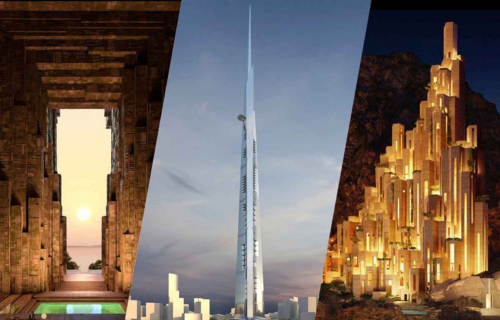
Norlana is a new ultra-modern residential community being developed in northwest Saudi Arabia as part of NEOM.
Situated on the coast of the Gulf of Aqaba, Norlana will consist of 711 properties including mansions, apartments and beach villas integrated with the surrounding natural dunes.
It will offer luxurious living and cater to active lifestyles, with amenities like a 120-berth marina, 18-hole golf course, equestrian centre and facilities for water sports and sailing.
Sustainability is a top priority for Norlana. It is being designed and built to preserve the coastal and marine environments.
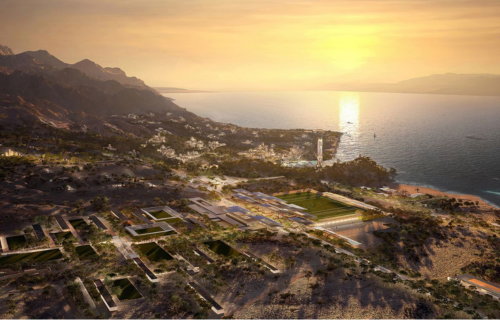
While providing ultra-luxury living, residents will be able to experience the beauty of the location and immerse themselves in sports, wellness and passion pursuits.
Norlana aims to set a new standard for contemporary sustainable communities and complements other tourism destinations announced recently in the Gulf of Aqaba as part of NEOM’s regional development plans.
NEOM recently unveiled Utamo, a new immersive destination for art and entertainment located along the Gulf of Aqaba coastline in northwest Saudi Arabia.
Utamo will be housed within a mountain cocoon and designed to seamlessly blend architecture with the surrounding natural beauty.
It will serve as a one-of-a-kind venue hosting music, art and cultural events through advanced audio-visual systems that promise to deliver sensory experiences.
Guests will be able to arrive via a landscaped garden pathway and enter through a towering 64-metre-high entrance hall.
Sustainability is a top priority, with cutting-edge construction techniques used to minimize environmental impact. Utamo aims to redefine entertainment through productions that converge reality with the digital realm.
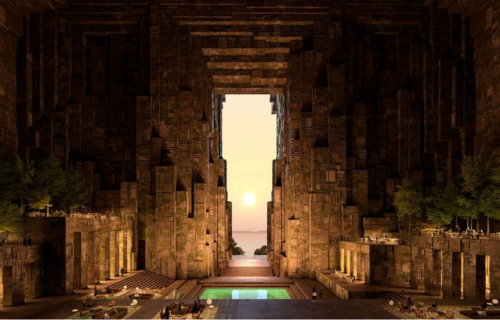
It will provide a place for the world’s greatest artists to showcase their talents within exclusive performance spaces, VIP lounges and signature restaurants.
In line with NEOM’s regional development goals, Utamo complements recently announced sustainable tourism destinations like Leyja, Epicon and Siranna along the Gulf of Aqaba coastline.
NEOM also announced Siranna, a new exclusive tourism destination located along the Gulf of Aqaba coastline in northwest Saudi Arabia.
Siranna will consist of a 65-key luxury hotel and 35 high-end residential properties, taking advantage of uninterrupted views of the Red Sea. The destination’s hexagonal pillar architecture will seamlessly blend into the rugged mountains and flora.
Guests will arrive by boat to the secluded bay and journey through natural rock formations to reach the enchanting entrance. Siranna aims to offer an escape for relaxation and original thinking through amenities like a beach club, spas, wellness facilities, and dining options.
Sustainability is a core focus during Siranna’s development, with techniques used to preserve the surrounding landscape and heritage. Trails through the connecting sea, mountain and wadi ecosystem will provide exploration opportunities.
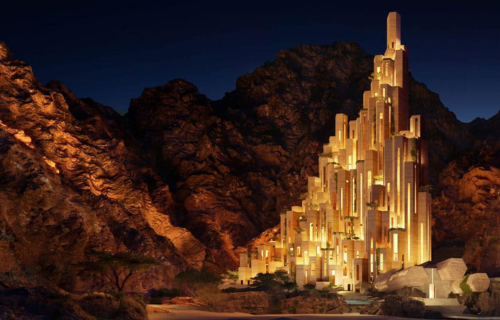
In line with NEOM’s regional vision, Siranna will deliver an ultra-luxurious hospitality experience while supporting future sustainable living.
It complements other tourism destinations recently announced in the Gulf of Aqaba, to create spaces in nature that nurture creativity through conservation-centered development.
NEOM’s Epicon, a new luxury coastal tourism destination located on the Gulf of Aqaba, will feature two striking towers up to 275 meters tall housing a 41-key ultra-premium hotel and luxury residences.
It will also include a 120-room resort and 45 beachfront villas situated near the hotel. The development aims to set new standards for hospitality and architecture through indulgent amenities and experiences for guests and residents to escape everyday stresses.
These include a beach club, spa, watersports, and destination dining overlooking spectacular shorelines. Cutting-edge innovations and world-class services and facilities within the luxurious residences and villas seek to deliver iconic living.
Epicon aims to position itself as a benchmark destination through unrestricted access to state-of-the-art amenities within spectacular Gulf views.
In line with objectives to strengthen NEOM’s ecotourism sector, it follows the recent announcement of the sustainable tourism development Leyja within a natural valley setting. Epicon and Leyja will enrich the experience offerings in NEOM and the broader Saudi tourism industry, aligned with the Kingdom’s vision.
Leyja is a new tourism destination being developed in NEOM, Saudi Arabia’s mega-project located in the country’s northwest corner.
Leyja will be centred around a natural valley surrounded by 400-metre-high mountains, located along the coast of the Gulf of Aqaba. It aims to preserve 95 per cent of its land for nature, with three designed hotels that blend into the landscape.
The hotels will each have 40 rooms and offer distinct experiences catering to activities like adventure, relaxation, and wellness.
Once complete, Leyja will provide a variety of experiences for visitors centred around sustainability and nature.
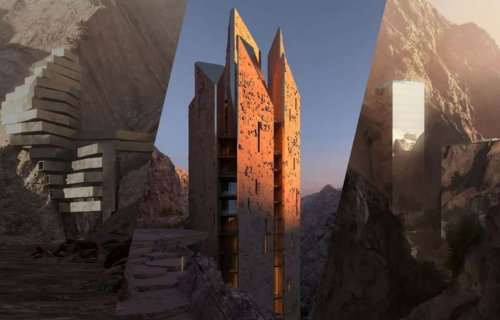
These will include fine dining options from world-renowned chefs, wellness facilities like infinity pools, and guided activities in the stunning mountain scenery such as hiking trails and rock-climbing.
The goal is to develop eco-friendly tourism that supports Saudi Arabia’s Vision 2030 plans while protecting the natural environment of the unique valley setting.
The Line is a linear city project within NEOM, an ambitious mega-city development in northwestern Saudi Arabia.
Stretching over 170 kilometers, The Line is envisioned as a carbon-neutral vertical city that would avoid the use of cars through its walkable, dense design.
It would contain all necessities of city living including homes, schools, workspaces and parks directly accessible by foot, public transport or through a high-speed rail network.
With nature and green spaces integrated throughout, The Line aims to maximize resource efficiency while offering a high quality of life for its anticipated 9 million residents.
The Line’s vertical design is planned to minimize land and energy usage while connecting residents through social spaces.
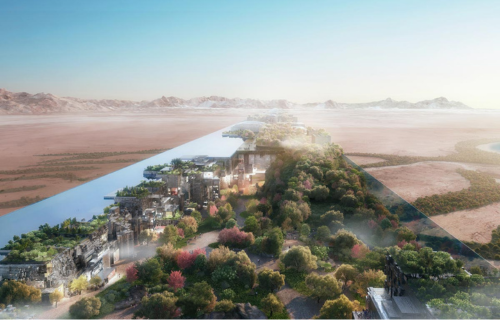
Towering structures up to 500 meters tall will contain modular mixed-use pods organized to foster constant social interaction and access to the outdoors.
Cutting-edge technology like autonomous transport will further enhance sustainable living. When open, The Line could fundamentally transform urban design and connectivity while reducing Saudi Arabia’s environmental footprint as the country works to diversify its economy as part of Vision 2030.
Trojena, located in NEOM in the kingdom’s northwest, covers 60 square kilometres with elevations ranging from 1,500 to 2,600 meters above sea level.
It is expected to be completed by 2026 and will have skiing and other winter sports facilities to host the 2029 Asian Winter Games.
The project aims to develop mountain tourism in Saudi Arabia by taking advantage of the region’s winter temperatures which can dip below zero degrees.
In addition to hosting the Games, Trojena will include residential areas for up to 7,000 people as well as hotels, restaurants and other amenities.
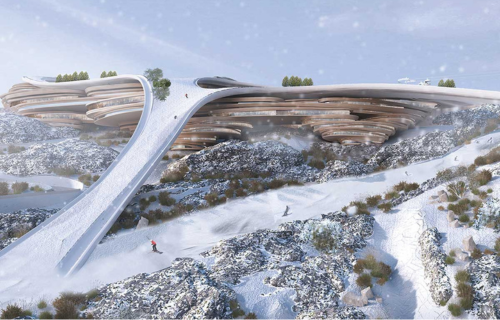
Some key attractions will be a ski village, wildlife reserve, and luxury mansions. The goal is for Trojena to attract 700,000 annual visitors and contribute $800 million annually to Saudi Arabia’s GDP by 2030, as part of the country’s Vision 2030 plan to diversify its economy away from oil.
The mountain destination is expected to create over 10,000 jobs and establish Saudi Arabia as a center for winter sports tourism.
Saudi Arabia’s NEOM is developing the floating city of Oxagon in the Red Sea near the Suez Canal.
Oxagon has a unique oxagon shape and will primarily consist of factories, manufacturing facilities, and logistics sites to serve as a major new logistics and industrial centre.
It will focus on sectors like renewable energy, food production, and digital technologies. Oxagon is planned as a fully sustainable, zero-carbon city and will include the world’s first fully integrated port and supply chain ecosystem. It has already attracted major corporate tenants and will generate around 90,000 jobs by 2030.
In addition to industrial areas, Oxagon will feature waterfront residential communities that are integrated with nature.
The communities will use ocean cooling and be resilient to rising sea levels. Residents will be able to commute around the city through hydrogen-powered transport or walking.
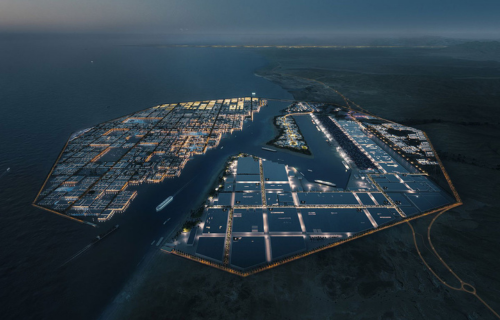
Oxagon will also have an innovation campus to drive research and help create a circular economy.
While some initial logistics facilities may be ready by 2025, Oxagon’s full development is planned to be completed by 2030, cementing Saudi Arabia’s NEOM region as a global hub for advanced manufacturing and innovation.
Saudi Arabia’s NEOM megaproject will open a new luxury island destination called Sindalah in 2024.
Situated off NEOM’s coast, Sindalah will cover over 840,000 square meters and consists of a group of islands.
It will feature three luxury resorts, a yacht club, over 50 luxury brands, and 86 piers. The island is expected to create 3,500 jobs in tourism and hospitality.
Sindalah will act as a gateway to the Red Sea, offering visitors customized boating experiences. It aims to attract over 2,400 visitors per day by 2028.
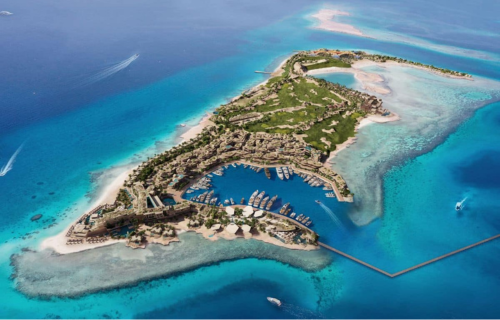
Sindalah is planned to be fully pedestrian-friendly, with no roads or cars on the island. The public areas will be designed to encourage social interaction and allow amazing views. Facilities will be within a five-minute walk of each other.
NEOM’s chief planner described Sindalah as a frontier for leisure, exploration and fulfilment, providing new experiences with sustainability, connectivity and enjoyment in mind. The luxurious island destination is meant to showcase NEOM and Saudi Arabia’s potential for Red Sea tourism under Vision 2030.
Saudi Arabia is developing a new downtown district called New Murabba near Riyadh, with completion targeted for 2030.
Spread over 19 square kilometres, it will include over 25 million square metres of built space to accommodate hundreds of thousands of residents.
In addition to new homes, New Murabba will feature commercial and cultural attractions, along with 15 minutes of walking access to amenities and 20 minutes from the airport.
Sustainability is also a priority, with green spaces and cycling/walking paths promoting healthy living. The project is projected to contribute $48 billion to the non-oil GDP and create over 300,000 jobs.
At the center of New Murabba will be The Mukaab, one of the world’s largest structures shaped like a 400-metre cube. It will serve as an immersive cultural destination brought to life with digital technology.
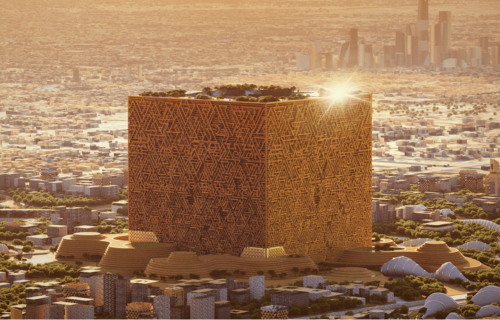
The skyscraper’s intricately carved façade will pay homage to Islamic heritage. Rising atop a spiral base, The Mukaab will offer 2 million square meters of space for attractions, residences, hotels, retail and recreation.
Holograms will also be used to allow visitors to experience different environments at the site.
The Jeddah Economic Company has resumed construction on the Jeddah Tower project in Saudi Arabia.
The tower is set to surpass 1,000 meters in height and become the world’s tallest building, topping Dubai’s Burj Khalifa by over 172 meters.
JEC has initiated the bidding process for contractors to complete the record-breaking structure.
Major companies from Saudi Arabia, South Korea, China and elsewhere have been invited to bid, with joint ventures between local and international partners expected to be formed.
Contractors have already conducted initial site visits in preparation for their proposals.
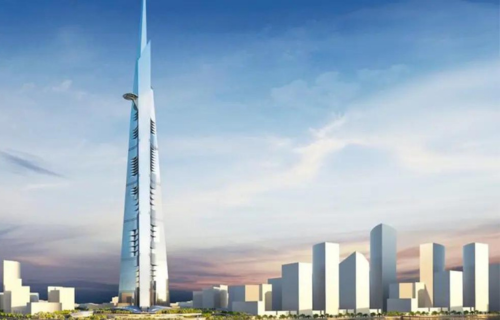
Dubbed Kingdom Tower, it will serve as the centerpiece of the massive Jeddah Economic City development spanning 1.5 square kilometers.
When complete, it will include luxury residential units from 2-6 bedrooms to accommodate a variety of living needs.
Residents will have access to extensive amenities such as shopping malls, boutiques, gourmet restaurants, tennis courts and the world’s highest observation deck offering panoramic views.
Offices, hotels like the Four Seasons, and condominiums will also be incorporated into the towering skyscraper development.
Desert Rock Resort is located in a hidden valley nestled between the mountains of one of the most dramatic desert landscapes in the kingdom.
The resort has 60 guest rooms that have been carefully integrated into the mountainside to preserve its natural silhouette.
Guests can choose from villas on the ground level, crevice suites built midway up the ridge, and excavated rooms constructed within the rock itself to take in unspoiled views of the desert valley below.
The resort offers state-of-the-art amenities like a world-class spa and fitness center, Aside from this, guests at the resort can take advantage of activities that include hiking across the stunning scenery, dune buggy rides, and stargazing.
Sustainable practices are prioritized in the design and construction, such as using local materials, regenerating native vegetation, and optimizing energy efficiency.
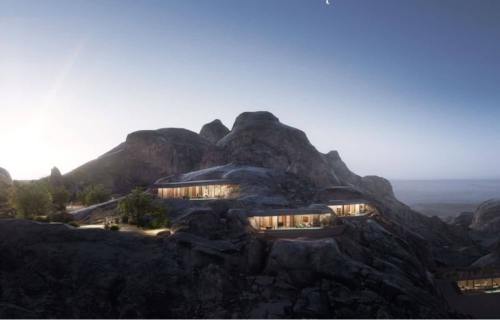
SEVEN, a subsidiary of Saudi Arabia’s Public Investment Fund (PIF), has announced the establishment of its fifth entertainment destination located in Abha, Aseer region.
With an investment of over SAR1.3 billion, the 64,000 square meter development will feature a diverse array of attractions for families and people of all ages across 79,000 square meters of indoor space.
Inspired by the region’s ancient stone architecture, the design seamlessly integrates with the local urban code to preserve cultural identity.
Expected to generate SAR4 billion GDP and over 5 million visitors annually by 2030, the theme park will create hundreds of jobs and support the Vision 2030 goal of developing a world-class entertainment sector.
The destination will include eight unique attractions from an indoor golf facility and e-karting to a 10-screen cinema and Play-Doh-themed zone.
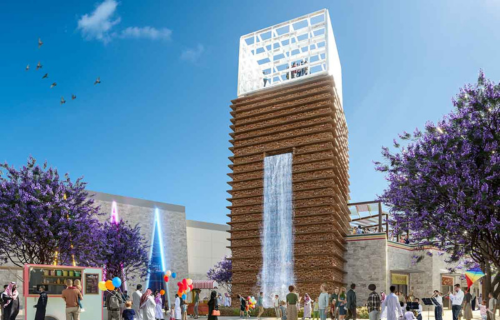
Partnerships with global brands like Warner Bros., Hasbro, and AMC will deliver high-quality experiences. Modern Building Leaders was appointed as the main contractor to execute the project sustainably using advanced technology.
Covering over 14 cities, SEVEN’s 50 billion SAR investment plan aims to establish 21 entertainment destinations nationwide.
Saudi Entertainment Ventures (SEVEN) has announced a new SAR1.1 billion ($292 million) entertainment centre coming to Yanbu.
Located along the seafront promenade on Al Nawras Island, the destination will feature carnival rides, a 10-screen cinema, a bowling alley, indoor golf, and a climbing facility.
Inspired by Yanbu’s heritage as one of Saudi Arabia’s oldest ports, the design celebrates the city’s coastal history.
AL BAWANI and UCC Saudi were awarded the construction contract to deliver this project, which will offer residents and visitors a variety of engaging experiences.
The new destination is anticipated to support Yanbu’s rapidly developing entertainment sector by meeting the needs of the growing population.
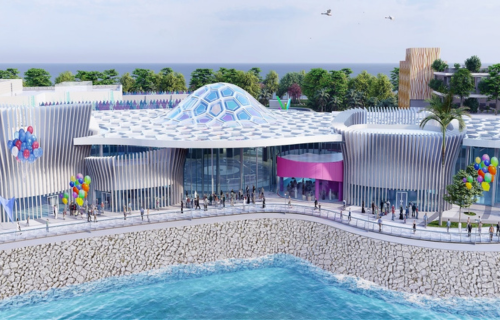
SEVEN’s overall SAR50 billion investment plan aims to establish 21 world-class entertainment destinations across 14 cities nationwide by 2030.
Partnering with global sector leaders, SEVEN strives to create a sustainable industry and enrich community life through innovative experiences at destinations like the upcoming facility in Yanbu.
Saudi Entertainment Ventures (SEVEN) has announced the construction of a new entertainment destination in Tabuk, located in northwestern Saudi Arabia.
With an investment value of over SAR1 billion, the destination will span 72,500 square metres of built space on 40,000 square metres of land near King Faisal Road.
Drawing inspiration from Tabuk’s culture and traditions, the design features a glass canopy and hydroponic tower paying tribute to the city’s heritage.
The development will feature attractions like a 4,000 square meter family entertainment center, junior entertainment center, and Discovery Adventures center developed with Warner Bros. Discovery.
It will also include facilities like an e-karting track, an indoor adventure golf course, futuristic bowling alley, and 10-screen cinema.
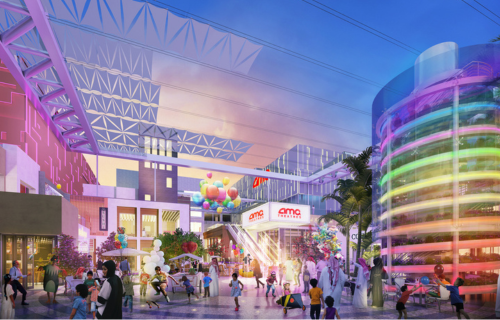
SEVEN aims to support Tabuk’s local economy by creating job opportunities and enriching community life.
Partners like Albawani Holding will help deliver world-class entertainment. As part of SEVEN’s overall SAR50 billion investment, the Tabuk destination is one of 21 entertainment complexes being established across Saudi cities to develop a thriving domestic entertainment sector in line with Vision 2030 goals.
The facilities will offer innovative experiences through global sector partnerships.
Saudi Arabia’s AlUla is an ancient heritage site with over 200,000 years of history. It contains important cultural sites, sandstone mountains and oases.
The kingdom is transforming AlUla into an international tourism destination through an ambitious master plan led by Crown Prince Mohammed bin Salman.
The plan aims to increase visitation and economic growth in the region. It will develop AlUla into five historic districts connected by trails and a new tram system.
Significant infrastructure and hotels will be built to accommodate tourists, with a target of 9,400 hotel rooms by 2035.
The goal of the multi-billion dollar project is to contribute greatly to Saudi Arabia’s economy and diversify revenues away from oil dependence. It aims to create 38,000 new jobs and add $32 billion annually to GDP by 2035.
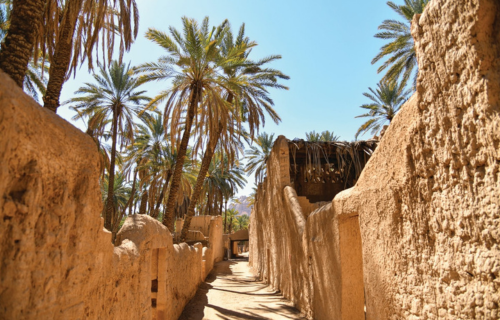
AlUla will feature new museums, cultural centers, and eco-tourism resorts carved into the sandstone mountains.
The project launched a new development company backed by Saudi Arabia’s huge sovereign wealth fund to transform AlUla into a global tourism destination and preserve its important ancient cultural heritage.
Amaala is a major luxury tourism development project located in northwest Saudi Arabia along the Red Sea.
Spanning 3,800 square kilometers, it will offer a variety of high-end resorts, residences, retail, dining, and entertainment options centered around wellness, culture, and sports. Some key aspects will include 14 top hotel brands, over 800 villas and homes, 200 fashion boutiques, an arts academy, and world-class marinas.
A unique “mirage-inspired” airport is also being built to serve the development.
The project aims to establish Saudi Arabia as a global luxury wellness and lifestyle destination.
It is focused on preserving the natural environment within the UNESCO Prince Mohammed bin Salman Natural Reserve where it resides.
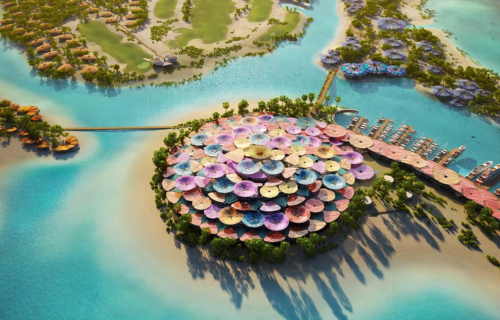
As a standalone company now, Amaala will independently implement strategies to realize this ambitious vision sustainably.
If successful, it hopes to become an icon for high-end sustainable tourism development in the Middle East and generate significant economic benefits for the country.
The Red Sea Project is an ambitious 30,000-square-kilometre sustainable tourism development located between Umluj and Al Wajh in Saudi Arabia.
Spanning pristine islands, desert landscapes, mountains and archaeological sites along 200 kilometres of untouched Red Sea coastline, the project will feature 8,000 luxury hotel rooms once completed by 2030.
It aims to be the first fully integrated mixed-use resort in the region while serving as a model for sustainable tourism through its zero waste, carbon neutral and single-use plastic ban policies.
The Red Sea Project aims to offer visitors a unique experience combining the natural beauty of the region with its rich cultural heritage.
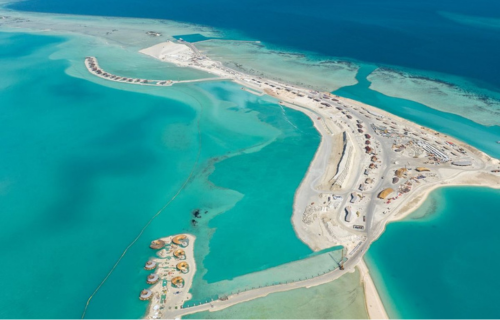
In addition to enjoying world-class accommodations near precious coastal and inland sites, guests will be able to explore the historical and archaeological treasures dotted throughout the vast desert setting.
With a focus on heritage, culture and environmental stewardship, the resort is positioned to become one of the most exciting new tourism developments in the Middle East region, providing an unforgettable luxury escape for travellers worldwide.
Diriyah, located just outside of Riyadh, is undergoing an ambitious transformation project to become Saudi Arabia’s new cultural capital.
At the heart of the project is the preservation of the At-Turaif heritage site, the historic mud-brick city where the original House of Saud was founded.
By 2030, the goal is for Diriyah to receive 27 million visitors annually and establish itself as a world-renowned destination for culture, heritage, hospitality, retail, education and residential living.
The development aims to honour Saudi Arabia’s traditions while providing modern lifestyle amenities.
The Diriyah project supports Saudi Arabia’s Vision 2030 economic reform plan by growing the tourism industry to welcome 100 million visitors each year.
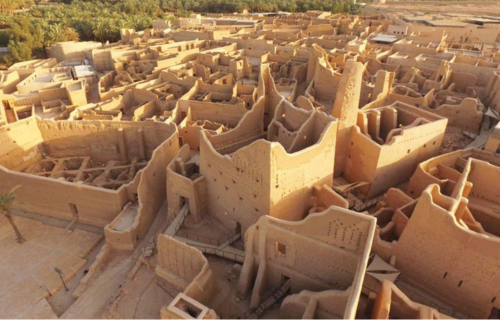
Diriyah will reconnect people with their roots through its cultural experiences and celebrate the origins of modern Saudi society.
It seeks to become a global gathering place through its mix of shopping, entertainment, dining and world-class homes, all within an urban center designed with Najdi architectural styles.
The King Salman Energy Park (SPARK) is a new industrial city under development in Saudi Arabia that aims to be a global hub for the energy sector.
Located strategically near ports and transport links, SPARK will provide tenants and investors unparalleled access to regional and global energy markets.
With its world-class infrastructure and services, SPARK hopes to attract energy companies to expand their operations and take advantage of the efficiencies offered by the integrated ecosystem.
SPARK is a major project that aligns with Saudi Arabia’s Vision 2030 economic diversification plan.
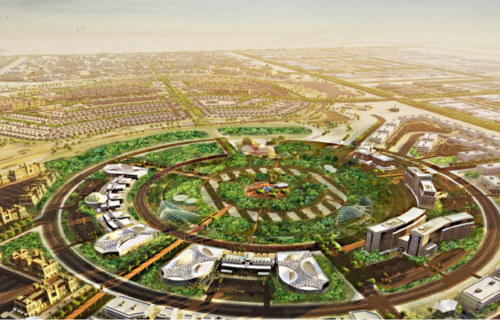
It is projected to contribute significantly to GDP and job creation. With sustainability as a core focus, SPARK envisions serving as an innovative platform to propel the energy industry forward.
By providing an excellent business environment and bringing value to communities, SPARK prepares for its grand opening and encourages energy sector stakeholders to seize the opportunities on offer to grow their businesses.
King Salman Park in Riyadh, Saudi Arabia will be the largest urban park in the world once completed.
At over 16 square kilometres in size, the expansive park is part of Vision 2030, Saudi Arabia’s plan to improve life in the cities.
The park will offer a variety of cultural, recreational, and sports activities for both residents and visitors. It will feature open green spaces like gardens as well as cultural attractions like museums and theatres housed in the 400,000 square metre Royal Arts Complex.
In addition to entertainment venues, the park will include residential and commercial facilities.
There will be 12,000 housing units and 16 hotels with over 2,300 rooms. Retail, medical, educational and social center covering over 500,000 square meters will also be built.
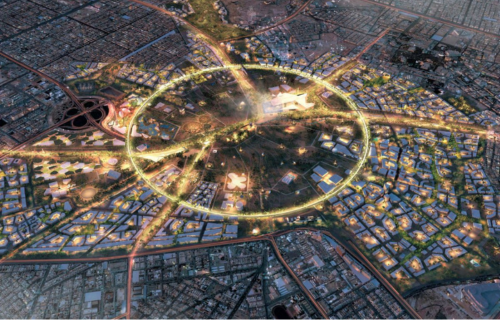
Comprehensive transportation links like five metro stations and ten bus stations will ensure the park is easily accessible.
Extensive walking trails and other amenities like a golf course and amusement park mean King Salman Park will be a vibrant destination for all in Riyadh once completed.
Qiddiya is a massive new entertainment city being built near Riyadh, Saudi Arabia.
It is part of Saudi Arabia’s Vision 2030 economic diversification plan led by Crown Prince Mohammed bin Salman.
Qiddiya will feature theme parks, sports facilities, arts venues, and attractions focused on sports, nature, mobility, and culture.
It aims to create jobs, empower the local population, especially youth and women, and attract both domestic and international visitors.
A major groundbreaking ceremony attended by King Salman underscored the enormous scale of the project.
Once completed, Qiddiya is envisioned as a global destination that will transform Saudi Arabia’s economy, society and culture.

It has already created opportunities for investors, contractors and partners during the construction phase.
Qiddiya represents an ambitious new era for the Kingdom as it develops sectors beyond oil.
Its success could significantly boost domestic spending and investment while enhancing Saudi Arabia’s image internationally through entertainment, sports, arts and tourism.
The Sports Boulevard project in Riyadh, Saudi Arabia aims to promote healthy living through sports and exercise.
Stretching 135 kilometres through the city, it will connect Hanifah Valley in the west to Al Salai Valley in the east.
The boulevard provides over 4 million square metres of open green space, including a 20-square-kilometre desert park with event venues, outdoor museums, and movie theatres. It is divided into seven zones catering to different activities like cycling, arts and culture, environmental sustainability, and more.
The project aligns with Saudi Arabia’s Vision 2030 initiative to transform the economy and put Riyadh among the top 100 cities globally.
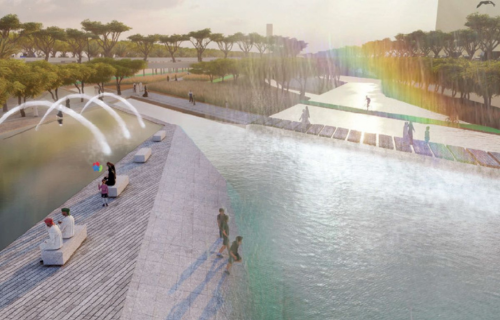
It seeks to encourage physical activity and a healthier lifestyle for Riyadh residents by providing spaces to walk, cycle, and ride horses.
The Sports Boulevard will also attract investors and drive the city’s growth by enriching its cultural offerings and recreational activities. With over 60 sports facilities, it aims to make sports more accessible for the people of Riyadh.
The Riyadh Metro in Saudi Arabia is slated to become the largest public transport network project in the world upon completion.
The metro will consist of 176 kilometres of railway lines on which electric trains will operate autonomously.
Over 40 per cent of the train routes will be underground lines. The network is being developed as part of the King Abdulaziz Public Transport Project, which is valued at a massive $22.5 billion.
The first phase of the Riyadh Metro is expected to begin operations as early as March of this year, according to Fahd Al-Rasheed, CEO of the Royal Commission for Riyadh City. Al-Rasheed stated that subsequent phases will launch shortly after the first phase debuts.
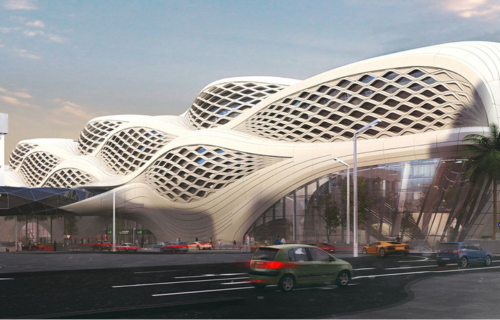
The goal is to have the full Riyadh Metro network up and running before the end of the year. Once completed, it will be the largest single-phase public transport undertaking ever developed.
Source: Arabian Business